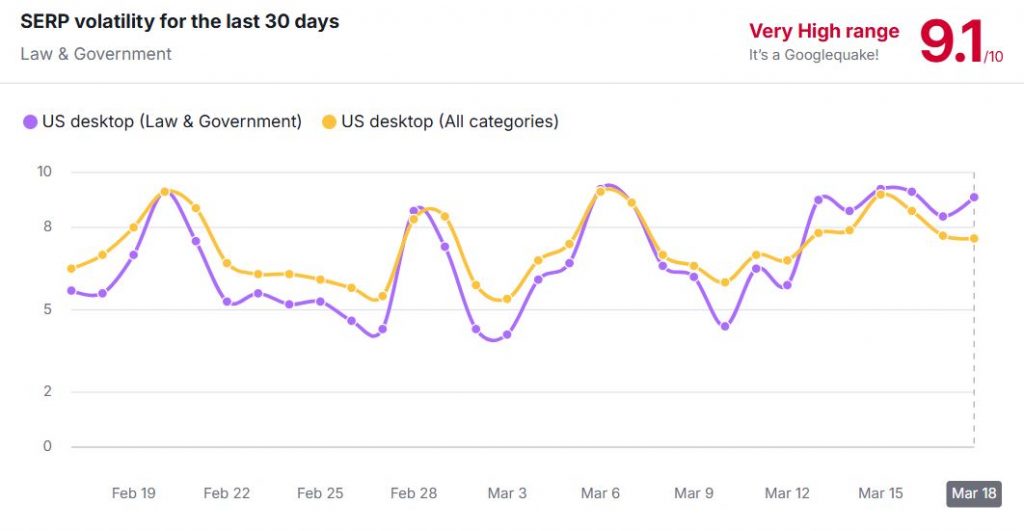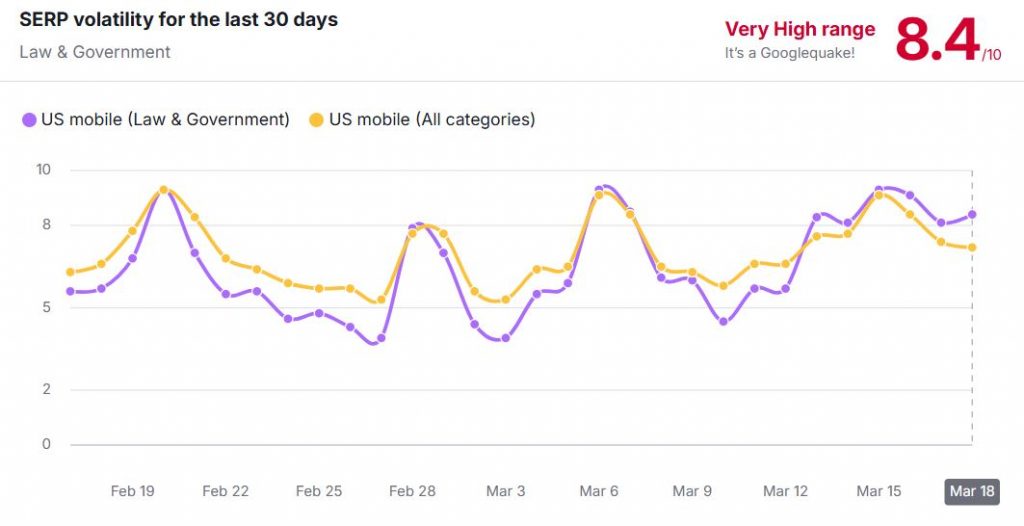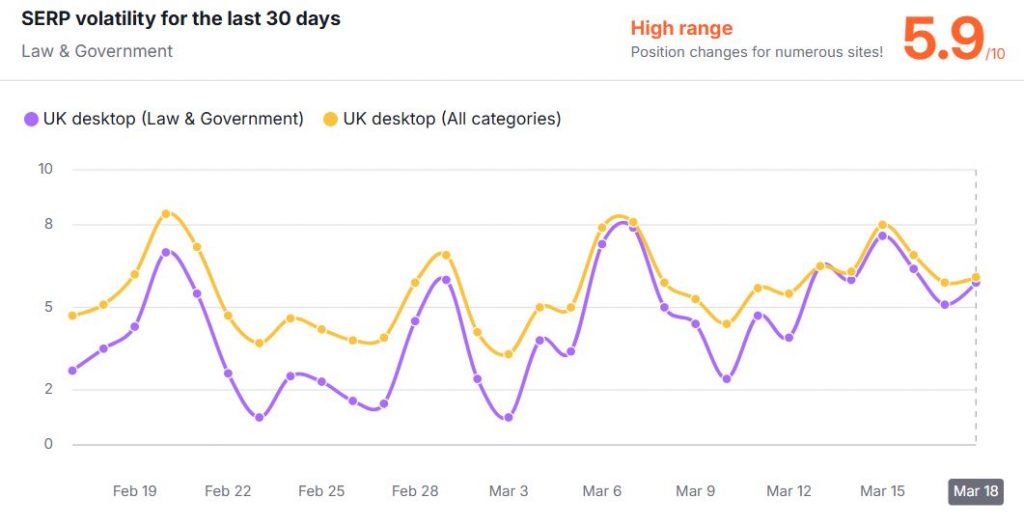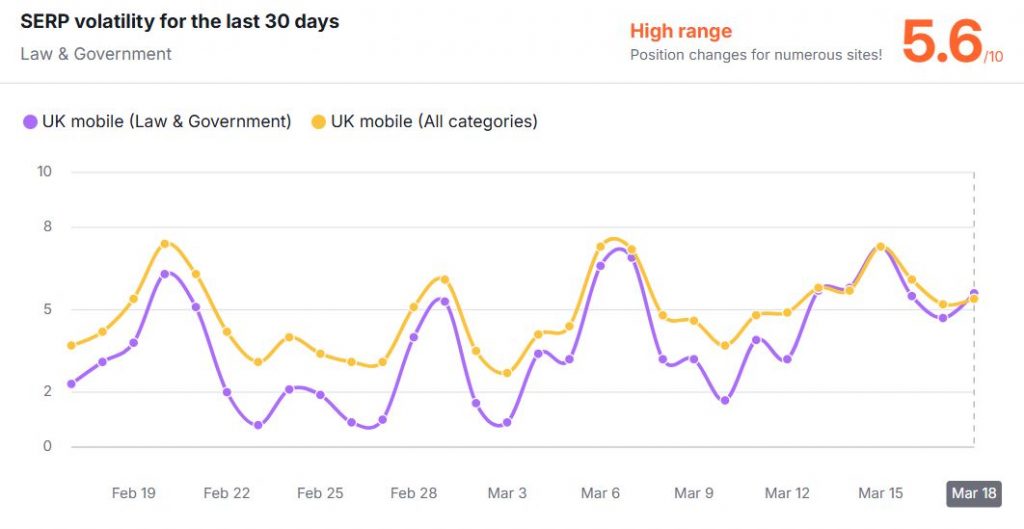Google began rolling out its first core algorithm update of 2025 on March 13th, making significant changes that could impact how law firm websites rank in search results. The update, which Google announced at 12:30 pm ET, is expected to take approximately two weeks to complete.
What We Know About the March 2025 Core Update
Google describes this as a “regular update designed to better surface relevant, satisfying content for searchers from all types of sites.” The company also mentioned they will “continue our work to surface more content from creators through a series of improvements throughout this year,” indicating that some changes have already been implemented with more to come.
This update follows a series of major changes to Google’s algorithm in 2024, including the December 2024, November 2024, and August 2024 updates. Notably, the March 2024 core update was described by Google as their largest ever, so this latest update continues a pattern of significant algorithm adjustments.
How This Might Affect Law Firms
Based on my many years of SEO experience, here’s what law firms should be aware of:
- Potential Ranking Fluctuations: During the rollout period, you might notice significant changes in your website’s rankings for key practice area terms. These fluctuations often stabilize once the update is fully implemented.
- Impact Beyond Standard Search: The update affects not just standard search results but also Google Discover and other features like featured snippets. This is particularly relevant for law firms that have been focusing on optimizing for these additional visibility opportunities.
- All Content Types Affected: This update impacts all types of content globally, across all regions and languages, making it especially relevant for law firms with international offices.
Update: Semrush’s Sensor is showing that US SERP volatility has spiked, across mobile and desktop, for Law & Government website rankings since March 13th when the core update started rolling out. This means that rankings are changing a lot after the update started. We are also seeing that SERP volatility for Law & Government sites is higher than the average of all categories.


The UK SERP volatility is much lower than the US. Law & Government website volatility in the UK Google SERPs is also lower than the All Categories average.


What Should Law Firms Do?
If you notice changes in your rankings or traffic, don’t panic. Here are some practical steps to take:
Monitor Your Analytics
Keep a close eye on your website’s performance over the next few weeks. Look for:
- Changes in organic traffic from Google
- Shifts in keyword rankings for your primary practice areas
- Variations in user engagement metrics (bounce rate, time on site, etc.)
- Performance of your most important service pages
Assess Your Content Quality
Google continues to emphasize “helpful, reliable, people-first content” in its guidance. For law firms, this means:
- Review your practice area pages to ensure they thoroughly address client questions
- Examine your blog content for depth, expertise, and practical value
- Check that your attorney bios demonstrate genuine expertise and authority
- Ensure case studies and testimonials showcase real results and client benefits
Focus on Technical Health
While content is critical, technical SEO issues can still hold back even the best law firm websites. I’ve helped numerous businesses recover from technical SEO problems that were limiting their potential.
Make sure you’re checking for:
- Mobile responsiveness (with over half of global website traffic coming from mobile devices)
- Page loading speed (an important factor for both rankings and user experience)
- Proper indexing of all important pages
- Structured data implementation for law firms, such as LocalBusiness, People, and Reviews
While many firms handle their digital marketing in-house, others partner with specialized law firm SEO services to monitor and respond to these updates more efficiently.
Stay Ahead with The Law Firm SEO Digest – Your Bi-Weekly Guide to Attracting More Clients Through SEO
Every two weeks, I share practical SEO tactics and insights. No fluff, just real experience from my 15 years in the trenches of SEO.
Practical Next Steps for Law Firms
Based on what we’ve seen with previous core updates, here’s what I recommend law firms do over the next few weeks:
- Document Changes: If you notice ranking shifts, document which pages and keywords are affected most significantly.
- Analyze Competitors: Look at competitors who may have gained or lost positions alongside you. This can provide clues about what Google might be valuing more (or less) in this update.
- Focus on E-E-A-T: Google continues to emphasize Experience, Expertise, Authoritativeness, and Trustworthiness – all areas where law firms should naturally excel. Make sure your content clearly demonstrates these qualities.
- Plan Content Improvements: Rather than making reactive changes immediately, use the next few weeks to develop a thoughtful content improvement plan based on your observations.
- Consider User Experience: Google measures user experience in various ways and factors this into their rankings. Look to improve the UX of your website based on your target client’s unique challenges and user journey.
The Bigger Picture for Law Firm SEO
Looking at the broader context of this update, Google’s mention of “surfacing more content from creators” suggests they’re still working to balance the impact of AI-generated content against original, expert content – something that should ultimately benefit law firms producing authentic, authoritative legal guidance.
Final Thoughts
Core updates aren’t penalties but rather Google’s way of promoting and rewarding great web pages. For law firms that have been focusing on creating helpful, authoritative content, this update may actually present an opportunity to gain visibility over competitors who have been cutting corners.
The key takeaway is to stay patient during the rollout period. Major recovery from any negative impact typically comes after another core update, though some improvements might be seen between updates. Instead of looking for quick fixes, focus on consistently improving your content quality and user experience.
Remember that what makes for good SEO is increasingly aligned with what makes for good marketing: creating valuable resources that genuinely help your potential clients understand their legal options and position your firm as the right choice to assist them.
If you’re struggling to navigate these changes, working with an SEO agency for law firms that understands the unique challenges of legal marketing can help you adapt your strategy appropriately.






